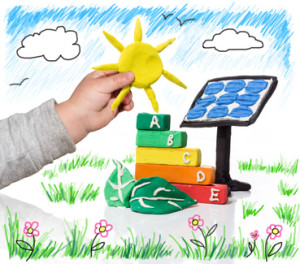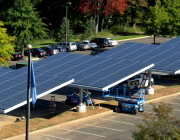 Solar energy is increasing in popularity. Many homeowners and businesses alike are turning to the energy generated by the sun to provide the power they need to operate homes and office buildings. However, the average American does not know or understand much about solar energy and how it works. Following is a basic overview of solar energy power that will answer the common question, “How does a solar power system work in homes and businesses?”
Solar energy is increasing in popularity. Many homeowners and businesses alike are turning to the energy generated by the sun to provide the power they need to operate homes and office buildings. However, the average American does not know or understand much about solar energy and how it works. Following is a basic overview of solar energy power that will answer the common question, “How does a solar power system work in homes and businesses?”
Parts of a solar energy system
There are three basic parts of a residential solar energy system. The solar modules are the large panels that are on top of a house to absorb sunlight. The inverter takes the power that is generated by the solar panels and turns it into power that the house can use. Specifically, it converts direct current (DC) power into alternating current (AC) power. The utility meter keeps track of and displays the energy that can be produced or used. Any energy that is not used gets put back into the grid.
How does a solar power system work?
There are two basic types of solar power systems, grid-tied systems and off-grid systems. Grid-tied systems use energy from the energy grid. They generate power onsite to give electricity a home or business that is connected to the grid. Off-grid systems are designed to be more self-reliant. They supply energy to a home or other facility that is remote and, therefore, do not have access to the grid. The electricity for off-grid systems is stored in large battery banks and is drawn from by its users when it is needed.
How does sunlight convert to solar power?
Solar panels use the energy of speeding photons to create an electrical current. The photons are created in the sun by the fusion of atoms. Once it reaches the surface of the sun, it can reach the Earth in about eight minutes. Just as the sun’s power has provided energy for plants and other living organisms on earth, it can provide energy for homes and businesses.
Banking energy
A solar energy system produces more energy in the summer than it does in the winter. People who use solar energy to fuel their homes can “bank” the energy they do not use during the warmer weather and use it within the following twelve months. Users only pay for their yearly net usage of power.
Benefits of installing solar panels in the home
Installing solar panels in the home has many benefits. Since the homeowner is producing the energy, utility bills will be lower. The photovoltaic (PV) system that provides the energy will typically last for more than two decades, so the homeowner is protected against frequent rate hikes by the utility company. The solar system may also increase the value of a home without emitting greenhouse gasses or other types of pollution that are harmful to the environment.
Getting a home ready to go solar
Before a house can be ready for solar energy, some prep work needs to be done. First, an energy audit should be conducted. Many municipalities require an audit of this nature for a homeowner to be eligible for tax breaks. If the solar panels are going to be installed on the roof, the roof should be inspected to see if it needs to be repaired or replaced. Then consumers must find solar installers who will guarantee their work and are certified by the North American Board of Certified Energy Practitioners (NABCEP). It is also wise to learn about solar technologies, financing options and PV incentives.
Tax incentives
Many municipalities offer tax incentives for homeowners who opt for solar energy power. There are both state and federal programs that can help homeowners defray the cost of installing solar panels. Homeowners who are interested in going solar should check with their local government offices to find out more about applying for these incentives.
Solar energy for business offices
Solar energy is not limited to houses. It has many benefits for businesses as well. Solar energy is harnessed for businesses the same way it is harnessed for home use. The energy that is generated for offices can be used to run all traditional office equipment. A business can see lower utility costs, but the benefits go beyond that. Using solar energy is a major step in a company reducing its overall operating expenses and increases its corporate sustainability initiative.
The energy generated from the sun provides enough power to benefit innumerable homes and businesses. Solar energy provides benefits for anyone that uses it, without hurting the environment with harmful greenhouse emissions.
Thank you for reading our blog! How can we help you? Contact us today.




